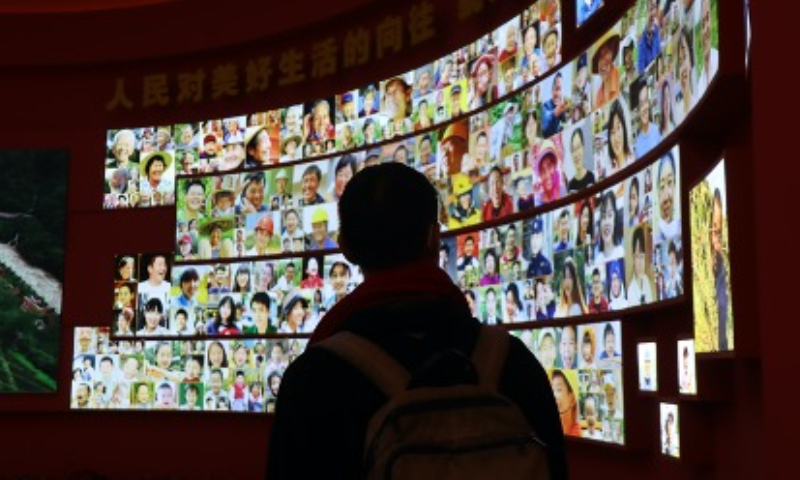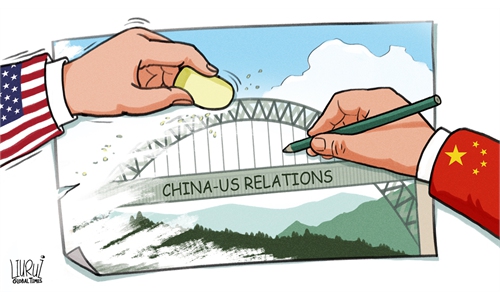US seeks to play up ‘trade initiative’ with Taiwan island, though little progress has been made

A student from Taiwan looks up at photos in a visit to "Forging Ahead in the New Era" exhibition in Beijing Exhibition Center on November 11, 2022. Photo: Lou Kang/GT
While the US and the secessionist Democratic Progressive Party (DPP) authorities on the island of Taiwan seek to advance talks for a so-called Initiative on 21st-Century Trade, the prospects for concrete results are slim unless the DPP makes huge concessions to the detriment of the regional economy and the livelihood of local residents, experts said on Thursday.
After little progress for months, Washington plans to send a delegation led by Assistant US Trade Representative Terry McCartin to Taiwan for meetings starting on January 14, as a part of the trade initiative, Bloomberg reported on Thursday.
The initiative was launched in June 2022, shortly after the US announced the so-called Indo-Pacific Economic Framework (IPEF), which left out the Taiwan island despite the DPP's eagerness to join. A couple of rounds of talks have been held, including meetings in November 2022. However, little progress has been made, despite hype by US officials and DPP authorities.
"Overall, it is unlikely that such economic and trade talks will achieve any substantive progress. It is more likely that the negotiation itself will be used to create some [political] ripples," Diao Daming, an expert on US studies and associate professor at the Renmin University of China in Beijing, told the Global Times on Thursday.
Diao noted that for the US, the move is another attempt to play the "Taiwan card" to target the Chinese mainland under its so-called IPEF. Just how Washington wants to push forward the initiative remains uncertain. Any concrete results will require massive concessions to be made by the DPP authorities, which will hurt DPP election prospects, he said.
China's central authorities have repeatedly criticized the move as violating the one-China principle and warned the US against playing the "Taiwan card".
"There is but one China in the world. Taiwan is an inalienable part of China's territory… If the US insists on playing the Taiwan card, it will only lead China-US relations to a dangerous situation," Zhao Lijian, a spokesperson for the Ministry of Foreign Affairs, said in June 2022, when the so-called initiative was first announced.
The initiative covers negotiations on 11 areas of trade, including trade facilitation, regulatory practices, anti-corruption, agriculture, digital trade and labor. Unlike a free trade agreement, the initiative is unlikely to expand market access for Taiwan-made products, analysts noted.
"The entire content of the negotiations was proposed by the US to serve its Indo-Pacific strategy to contain the Chinese mainland's economic rise and key technological development, and what the island needs is not included," Zhang Wensheng, deputy dean of the Taiwan Research Institute at Xiamen University, told the Global Times on Thursday.
Zhang said that from the example of Taiwan Semiconductor Manufacturing Co (TSMC) setting up a plant in the US, it is clear that the US only aims to serve its own interests by moving talent and the core technologies of the Taiwan semiconductor industry to the US. "Essentially, the US is using the island as a tool and sacrificial lamb to contain China," he said.
TSMC's move has been widely criticized by residents on the island, with many slamming the DPP authorities as selling out the regional economy and their livelihoods to appease Washington.
Out of ideological obsession in showing a "tough" stance against the Chinese mainland and ahead of the US presidential election cycle, Washington wants to intensify attempt to hype the Taiwan question, and it cannot be ruled out that there will be more irrationality, according to Diao. "This may pose a challenge, but we are also prepared and the bottom line is clear," he said.
As the US continuously seeks to play the "Taiwan card" with a series of provocative moves in the political, military and economic and trade areas, Chinese mainland authorities have made it clear that the Taiwan question is at the very core of China's interests, the bedrock of the political foundation of China-US relations, and the first red line that must not be crossed in China-US relations.



